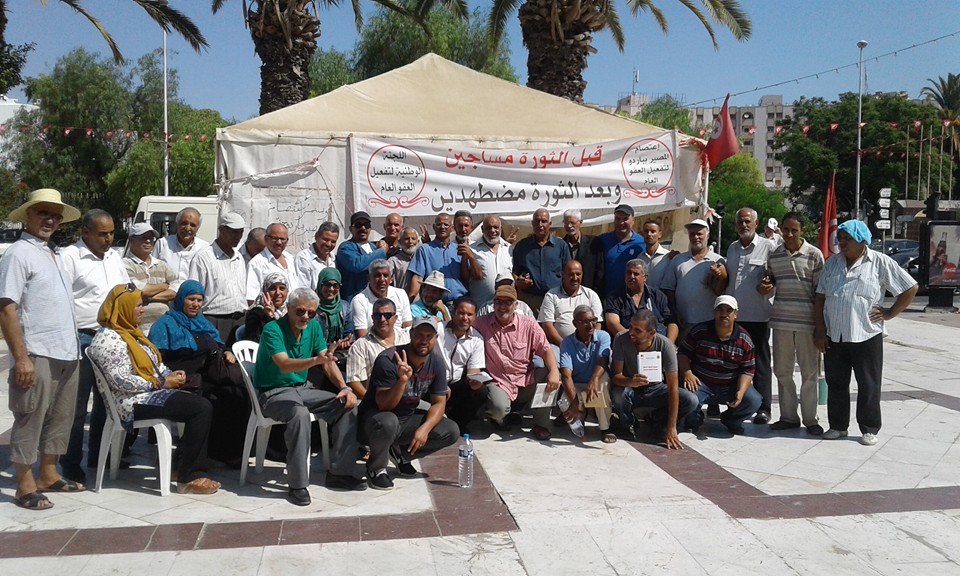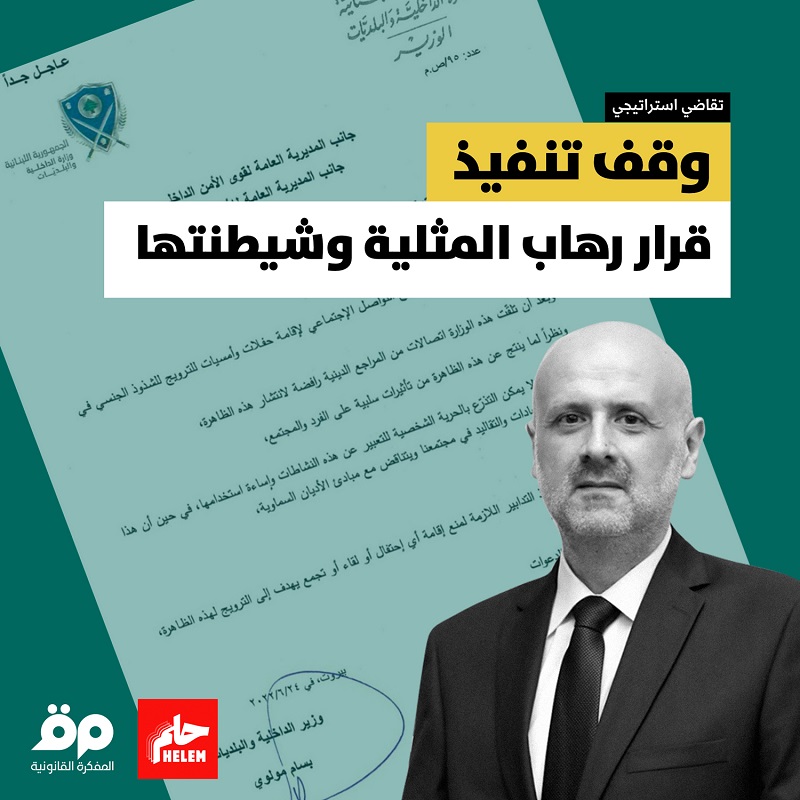Al-Masir Sit-in: Inflating the Victim Count has Marginalized Victims Themselves

Editor’s note: On 29 April 2016, a group of protestors set up their tents across from parliament on Tunis’ Bardo Square. They announced that they were beginning an open-ended protest, which they chose to call the al-Masir sit-in. They demanded the implementation of a general legislative amnesty. Their number included former political prisoners who were included within the general legislative amnesty. They had previously participated in the recurring sit-ins in Government Square in the Kasbah neighborhood demanding the rights that the legislature had granted to victims of the long authoritarian era – but which had been denied them due to political maneuverings. The aim of the al-Masir sit-in was therefore to accelerate the course of transitional justice, and highlight the dangers that had swiftly beset it.
Given its lack of supporters and its many critics, it was expected that the sit-in would not last. But against all expectations, the sit-in tents remained full of protestors. At their forefront were politicians and activists who participated in the seminars and gatherings held in the vicinity up until the leaders announced that they were ending their protest on 31 December 2018. The sit-in’s regular activities included protests each Thursday in front of the headquarters of the Truth and Dignity Commission, as well as demonstrations, seminars, and actions throughout the rest of the week aiming to discuss the weak points in the transitional justice process.
As its participants decided to end the sit-in, which may be the longest protest in post-revolutionary Tunisia, it is worth discussing its aims and outcomes, as well as the impressions of those who led it. The Legal Agenda met with the sit-in’s general coordinator, Muhammad al-Jami’i, to ask him about the sit-in, transitional justice, and expectations of what is to come.
The Legal Agenda: Can you tell us about the al-Masir sit-in?
Al-Jamiʿi: Our sit-in expresses a revolutionary demand agreed upon by those advocating for democracy both before and after the revolution. It was always said that the problems Tunisia suffered from before the revolution were political ones and that, accordingly, addressing them demanded a political approach. For this reason, the first legal statute issued after the revolution was a decree of general legislative amnesty. Later, however, it became clear that the amnesty did not achieve all that was required: we also need a process of transitional justice in order to uncover the truth, make reparations, and achieve reconciliation. Our sit-in was in defense of transitional justice, with the aim of realizing the goals of the revolution and preventing them from being overturned.
The Legal Agenda: It appears that there is a link between your sit-in and the Kasbah sit-in, which began in 2011 and also demanded the implementation of a general legislative amnesty. Is that the case?
Al-Jamiʿi: Yes, but only to a certain extent. After the general amnesty decree was issued, we realized that there was a political reluctance to implement it. That was the reason for the Kasbah sit-in: to advocate for the implementation of the legislative amnesty. After that, the Basic Law for Transitional Justice was passed and legislative amnesty became a part of the transitional justice process. The goal of the al-Masir sit-in was to defend the course of transitional justice, and specifically to resist those who are actively working against it.
We noticed that the transitional justice process was suffering from delays and obstruction. Within the social environment – that is, civil society – there was an inability to defend the interests of the victims of the authoritarian era. And so our sit-in became tantamount to a response to this state of affairs, with the aim of defending transitional justice. We found ourselves protesting against our limited capabilities and support, and defending the integrity of the transitional justice process – which has been subject to multiple forms of interference and violations.
The Legal Agenda: On whom were you aiming to exert pressure with your protests?
Al-Jamiʿi: As soon as the transitional justice law was passed, we studied its provisions as protestors and divided responsibilities among three groups: the Truth and Dignity Commission, the government, and parliament. We decided to fight to ensure that each of these fulfilled its obligations.
The government, for example, was required to establish a Dignity Fund. Yet it delayed doing so until April 2017. This shortcoming is damaging because it wasted important time that could have been spent mobilizing resources. The government was also supposed to play a proactive role in verifying the violations to which victims had been subject to and thereby clear them of the stigma of false victimhood.
If the government had cooperated with the Commission, and if the Commission had established better methods for its work, then the number of cases that the Commission investigated could have been fewer. Had that been the case, there would have been a significant sparing of efforts. This also would have meant the amounts earmarked for victim compensation would have been much lower. Instead, efforts were wasted on the files of those who were not actual victims, at the expense of cases involving genuine gross violations. In the same vein, the Commission should have carried out its work in accordance with a method that allowed for the aims of transitional justice to be realized. But our hopes for the Commission were met with disappointment. And so in order for the process to advance, it fell to parliament to exercise its oversight role vis-a-vis the government.
The Legal Agenda: Your work included a number of cases referred to as “classified for security reasons.” These referred to the cases of former members of the Tunisian General Student Union who were banned from public employment during the authoritarian period because of their union activism [under the pretext that they posed security threats]. How do you assess the way that the government and the Commission have addressed this matter?
Al-Jamiʿi: When it comes to these cases, I want to point out that nobody who involved themselves in the matter – from the government to the Tunisian General Labor Union to the leftist political parties – adhered to the principles of transitional justice. These principles must be the sole means for determining who is counted as a victim, and on the basis of the rules for reparations. But these cases were significantly marred by corruption, in the sense that they were granted status as victims by way of direct and extralegal appointments [prior to the establishment of the Truth and Dignity Commission]. This applied to individuals who claimed they were victims, while the government later put an end to the direct appointment of those who were included in the general legislative amnesty – even though the fact that the latter individuals had suffered harm had been established by law.
Furthermore, some of those included in the dossier of those “classified for security reasons” are no older than 24 years old. This means they were children during the Ben Ali era. There was a political deal struck between a number of factions, whose rhetoric has continually targeted the rights of genuine victims of violations. This deal was concluded extralegally, as the law designates the Truth and Dignity Commission as the body authorized to decide who is a victim. That label has no basis if a case was not put before the Commission. Nor is it permissible to extend such an authorization [of status as a victim] to one category for political considerations, while denying it to others.
The Legal Agenda: In what ways do you take issue with the Commission’s work?
Al-Jamiʿi: In transitional justice, there is an expectation that justice will be swift, prompt, and fair. Its aims also include changing the status of the individual by providing aid to victims and putting a provisional stop to the harm they have experienced. The Commission made a procedural mistake in the way it compiled its files, which resulted in an inflation of the victim count. Had it worked from the beginning to do a true screening of these files in order to determine the genuine victims, it could have saved both time and effort, and directed its potential towards the achievement of its goals.
The Legal Agenda: Some have accused your sit-in of being a movement that aims to use the case of transitional justice for the benefit of the Ennahda movement, by interfering with the Commission’s work in such a way that violates its independence.
Al-Jamiʿi: Let us first agree that when it comes to transitional justice, the victims are political activists with specific positions, and they have faced persecution for their position. Therefore we cannot blame the victim for being partisan or affiliated with a given party; this in no way makes this accusation against us valid. We are defending a claim that is of national concern, and it is not our fault that multiple political factions turned against the transitional justice process after initially supporting it.
Since 2014 we have seen attempts at a soft coup against transitional justice. Its tactics have included denouncing victims as selling out the struggle and accusing them of affiliation with a particular political faction. And so, in general, it should be clarified that our goal is to defend all victims, and to defend the nation’s right to the truth. Our ranks include leftists as well as those who belong to the Yusufiyya movement. This itself should be enough to refute any biased accusations.
I will state here, and for the historical record, that the Truth and Dignity Commission previously issued a statement attempting to characterize our sit-in as criminal. We viewed this as an attempt to evade our scrutiny of its work; this kind of monitoring was one of the goals of our sit-in. Our response to the Commission’s charge was that the burden of proving its claims about our interference with its work lay with them. We also affirmed our right to criticize the Commission and others who interfered with the process of transitional justice. The source of our power was not, as has been claimed, due to partisan allegiances, but rather the integrity of our belief in our principles and our willingness to make sacrifices for them. We have never been, not for a single day, the front for a particular party, including Ennahda: rather we were acting as patriotic militants, and we are willing to suffer in defense of the values we believe in.
The Legal Agenda: Those who follow your actions have noticed a development: at first, your activities focused on criticizing the work of the Truth and Dignity Commission. But more recently your demands have focused on reparations.
Al-Jamiʿi: This is not true at all. We contributed to the Commission’s work by presenting the cases of 140 martyrs, and took responsibility for following up on these cases with the responsible parties. We have been involved in all of the dossiers associated with transitional justice.
The Legal Agenda: Why did you choose to end your sit-in at the same time that the Committee finished its work, on 31 December 2018?
Al-Jamiʿi: We decided that the end of the Commission’s work meant that there was no longer a justification for the sit-in to continue. It was a militant action aimed at confronting both what we viewed as the Commission’s shortcomings as well as attempts to demonize victims’ rights. And so its initial stage ended with the end of the Commission’s work. Regardless of our assessment of the Commission’s performance, we can now see that the matter has entered a new phase, which requires new mechanisms of action.
Here, and for the record, I will say that one of the most important achievements of the sit-in was that we thwarted the Commission’s attempts to transfer the reparations and compensation – to which victims are entitled to by rights – to a Development Fund. In 2015, we approached the government with a request for them to issue a special order setting up a Dignity Fund. To our surprise, the late minister Salim Shakir informed us that a draft order had been sent to the Commission for its opinion. While the minister offered us a trilateral meeting, the Commission did not accept his offer. At this point, it is clear to us that the Commission was planning a radical change in the idea of reparations. Namely, they were proposing to change the Dignity Fund into a Development Fund. This would have meant that in lieu of compensating victims, a new institution would be established in which victims would be stakeholders, and which would be designated for the development of various areas. We shot down this idea, which would have violated the victims’ right to compensation, with our campaign “Leave the Fund Alone.”
Regardless, the end of the sit-in does not mean the end of our struggle. We will continue the struggle until the process of transitional justice has been fulfilled; and we will continue to uphold its values which are necessary for the protection of the nation.
This interview is an edited translation from Arabic.
Keywords: Tunisia, al-Masir sit-in, transitional justice, Muhammad al-Jami’i, reparations, protest



